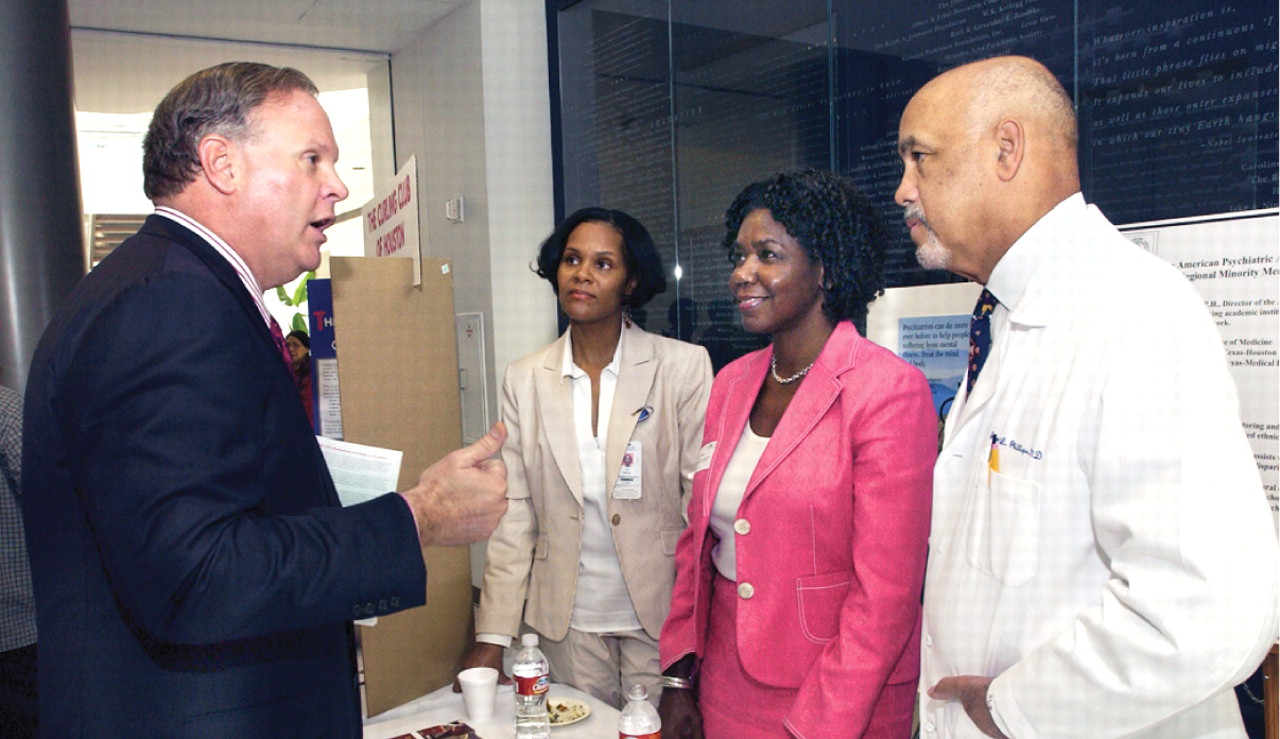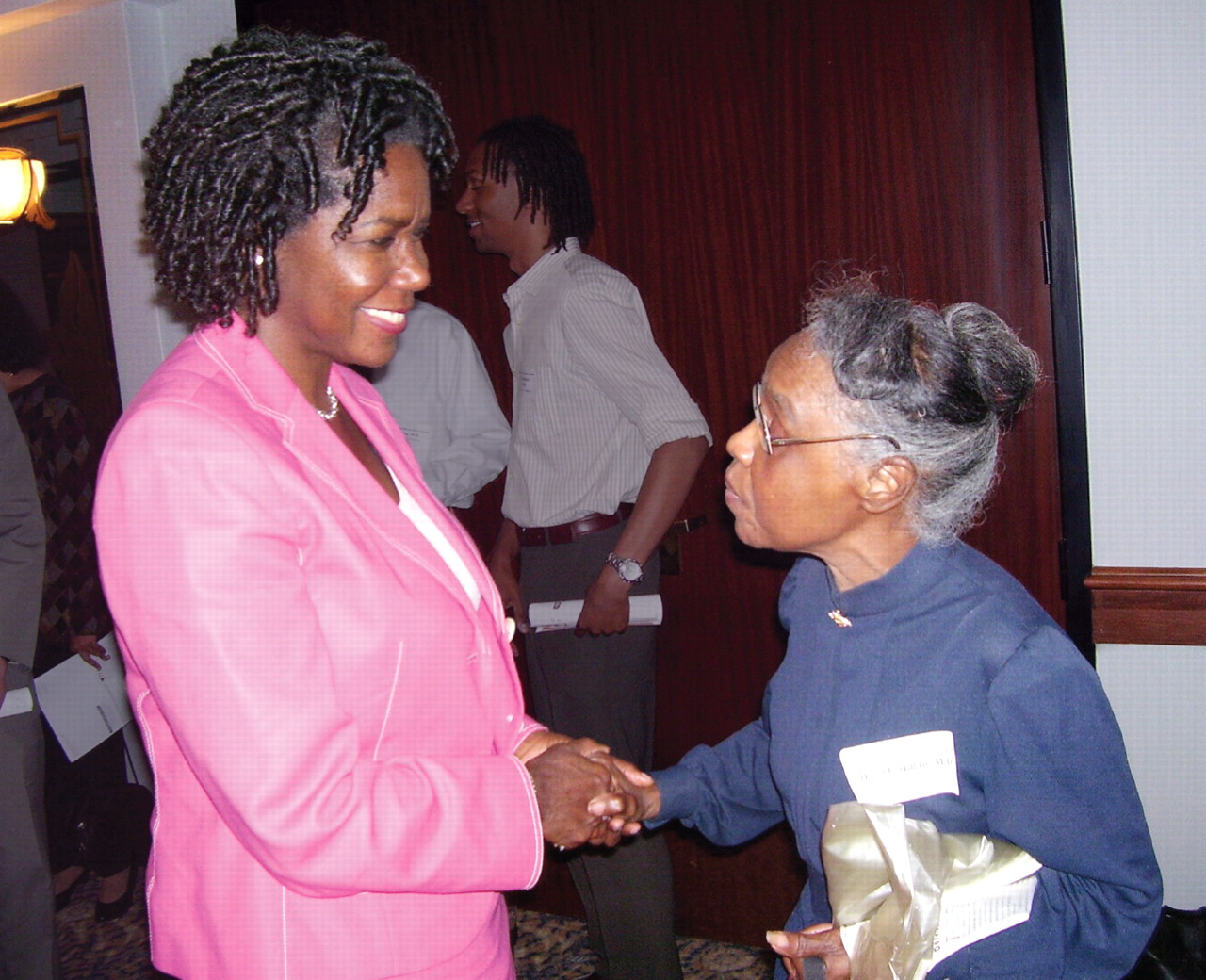Mentor Program Reaches Out to Minority Psychiatrists
A group of psychiatry trainees and seasoned psychiatrists from diverse racial and ethnic backgrounds gathered last month in Houston to discuss the creation of a groundbreaking mentorship program to foster professional collaboration and support.
That program, aimed at medical students, residents, and early career psychiatrists in the Houston area, is believed to be the first regional minority mentoring network in organized psychiatry.

Psychiatrists and trainees in Houston met last month to launch a local psychiatry mentoring network that will support minority trainees in their professional endeavors and increase racial and ethnic diversity within the workforce.
Credit: Eve Bender
“Having a mentor can be critical to having a successful career,” said Annelle Primm, M.D., M.P.H., director of APA's Office of Minority and National Affairs at a reception in Houston to introduce some of the psychiatrists and trainees who plan to participate in the network.“ For mentorship to have a significant impact, it needs to take place on the local level.”
Primm said she hoped the establishment of the Texas Regional Psychiatry Minority Mentorship Network will mark the beginning of an ongoing partnership between her office and the departments of psychiatry at various medical schools in the Houston area and help boost the number of minority residents and psychiatry faculty, to whom she referred as “an endangered species.” She emphasized the need for psychiatrists of all backgrounds to volunteer to be mentors.

The ultimate goal of supporting minority trainees and early career psychiatrists is to reduce disparities in mental health care for racial and ethnic minority patients, Toi Harris, M.D., tells attendees. Harris, who is an assistant professor of psychiatry at Baylor College of Medicine, spearheaded the mentoring initiative.
Credit: Eve Bender
“We need a group of psychiatrists who are committed to increasing diversity within the field of psychiatry and reducing disparities in mental health care to ensure quality care for all Americans,” she remarked.
She was joined by other APA leaders, including Priscilla Ray, M.D., who is a representative of the Texas Society of Psychiatric Physicians to the APA Assembly. Ray noted that psychiatrists “can find mentors everywhere. I think this is a great idea, and for mentorship to work, it has to start locally.”
Toi Harris, M.D., an assistant professor in the Menninger Department of Psychiatry and Behavioral Sciences at Baylor College of Medicine and a member of APA's Corresponding Committee on Poverty, Homelessness, and Psychiatric Disorders, told Psychiatric News that the idea of launching the Texas Regional Psychiatry Minority Mentorship Network came to her while supervising psychiatry residents and fellows at Baylor.

“The chance for the [Baylor College of Medicine] psychiatry department to take a leadership role in such an important initiative is one we should relish and work hard to develop,” says James Lomax, M.D., the Karl Menninger Chair of Psychiatric Education at Baylor College of Medicine.
Credit: Eve Bender
“I began to think more deeply about the impact of gender and ethnicity on patient care and on the practice of psychiatry,” she noted.
Harris said the Houston area is an ideal environment in which to implement the network due to the racial and ethnic diversity among its residents. She said the network will be “designed to provide mentorship and cultural competency training with the goal of reducing mental health disparities and improved recruitment, retention, and promotion of minorities from underserved and underrepresented backgrounds at all levels of training.”

Baylor College of Medicine President and CEO Peter Traber, M.D. (left), discusses the value of the minority mentoring network with Harris; Annelle Primm, M.D., M.P.H., director of APA's Office of Minority and National Affairs; and James Phillips, M.D., senior associate dean of Baylor College of Medicine.
Credit: Agapito Sanchez
Isolation Common
One psychiatrist whom Harris once supervised, Sherri Simpson, M.D., an APA/SA MHSA fellow and PGY-5 at Baylor College of Medicine, discussed the difficulties of leaving an all-black training environment. Before coming to Baylor, Simpson had gotten her undergraduate and medical degrees, respectively, from two historically black schools: Howard University in Washington, D.C., and Meharry Medical College in Nashville.
Simpson explained that after being with so many people of her own racial background, she suddenly found that she was one of only a few black people in the residency program at Baylor and felt isolated.
“At Baylor, I struggled with the support that was missing. I couldn't figure out how to re-create it,” she said.
Napoleon Higgins Jr., M.D., who completed his psychiatry residency training at the University of Texas Medical Branch in Galveston, noted that Simpson's experience is not uncommon.

Ayesha Mian, M.D., an assistant professor of psychiatry at Baylor College of Medicine (left), discusses mentorship with Harris (middle) and medical student Jasmin Owusu.
Credit: Eve Bender
“Oftentimes there is difficulty with transitioning into residency and understanding the nuances of residency training and in dealing with the majority group,” observed Higgins, president-elect of the Black Psychiatrists of America and Black Psychiatrists of Greater Houston. “As much as many would like to ignore it, racism and stereotyping still occur in America... .Many of these challenges can be embarrassing to residents and cause them to become further isolated, which compounds the stress of residency training.”
Meeting part icipant Anu Matorin, M.D., also noted that many minority trainees can feel isolated during residency.

Annelle Primm, M.D., M.P.H. (left), director of APA's Office of Minority and National Affairs, greets psychiatrist Mae McMillan, M.D., at a reception to launch a regional minority mentors network last month in Houston.
Credit: Eve Bender
Matorin, who is an associate professor in the Department of Psychiatry and Behavioral Sciences at the University of Texas Medical School at Houston, told Psychiatric News that many minority medical students, residents, fellows, and early career psychiatrists experience similar challenges throughout their professional careers and “report feeling isolated and detached from their professional peers, many times due to inadequate mentorship, uncertainty regarding how to seek out leadership positions, and lack of awareness regarding criteria for promotion and advancement.”
Mentorship Benefits All
To launch the network, APA leaders in May appointed Harris to lead a committee composed of medical school and psychiatry residency educators at Baylor College of Medicine and the University of Texas Medical School at Houston.
Committee members will meet with local and national experts in psychiatry to design and implement the mentoring network in the Houston and Galveston areas. They will then assign mentoring groups consisting of a medical student, psychiatry resident, psychiatry junior faculty mentor, and a senior psychiatry mentor. It is hoped that psychiatrists practicing in the community will be available “to provide an additional layer of expertise and cultural competence,” she noted.
Jasmin Owusu, a second-year medical student at Baylor who is interested in specializing in psychiatry, said it would be helpful for medical students to be able to join a pre-existing group to “support our interests and point us toward opportunities” in training, research, and academia.
James Lomax, M.D., the associate chair and director of educational programs and the Karl Menninger Chair of Psychiatric Education at Baylor College of Medicine, emphasized that mentees would not be the only ones to benefit from the mentoring experience.
“The value of the program to the mentors is the usual treasure of playing an important role in a developing professional's life plus the knowledge that you are doing this with someone who is currently underrepresented in academic medical centers and will have an expediential positive effect in the recruitment of other minorities,” Lomax told Psychiatric News.
Lomax said he believed the network will be a “nidus of activity” to help with the recruitment and development of minority faculty.
“The chance for the psychiatry department to take a leadership role in such an important initiative is one we should relish and work hard to develop,” he said. ▪



